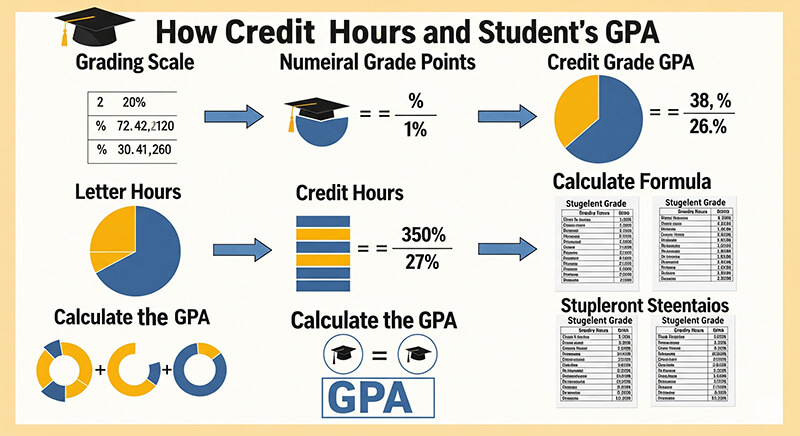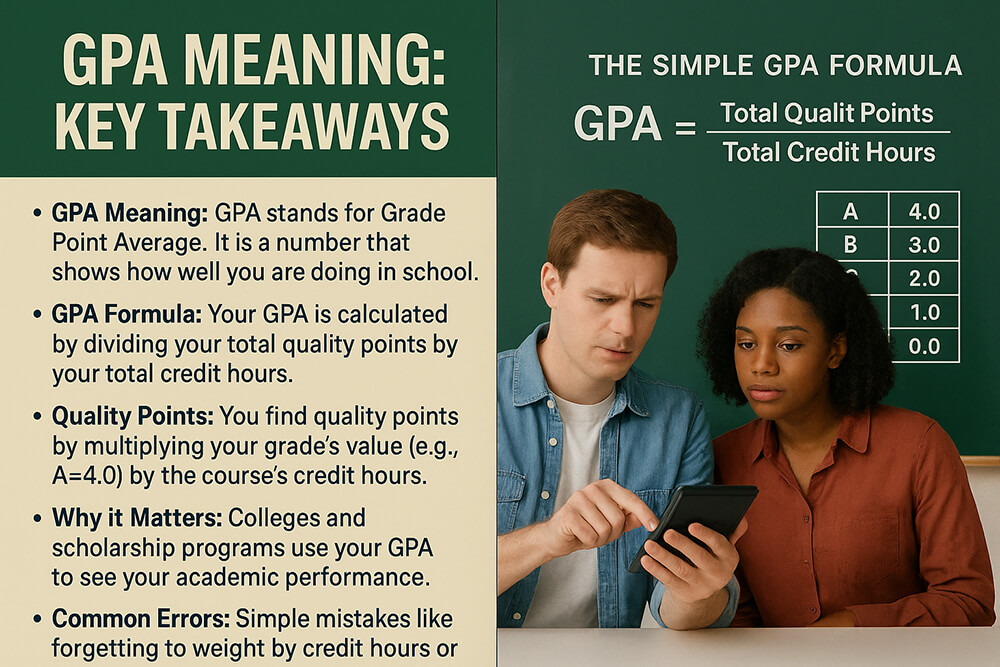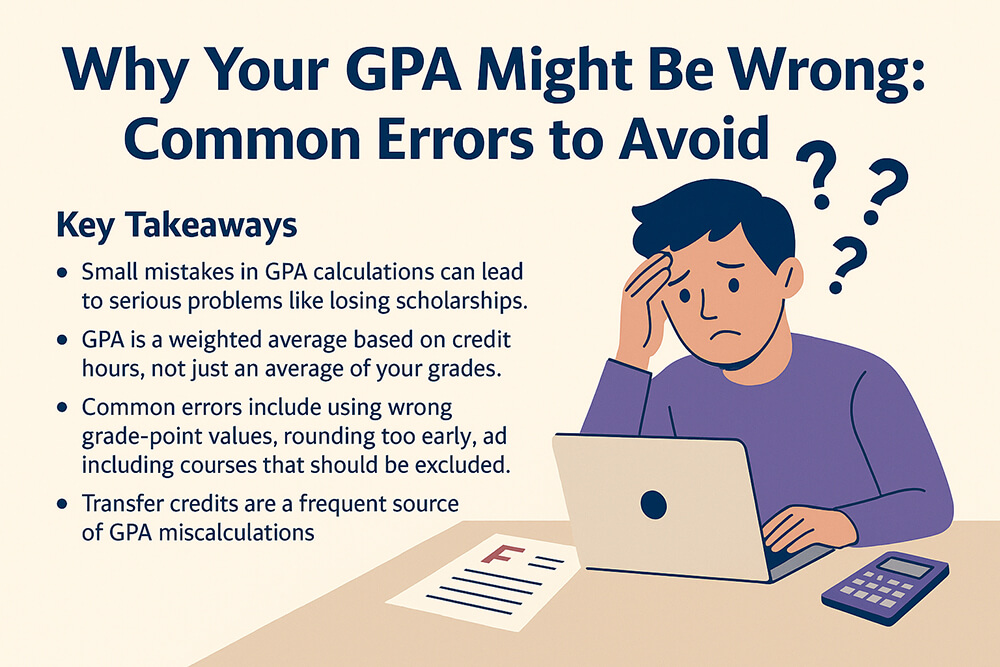Your Guide to Major-Specific GPA Calculators
Using a major-specific GPA calculator helps you see your grades in a new way. These tools let you focus on the classes that matter most for your degree. You can filter courses by your department, compare grades in different subjects, and even see how changing your major might affect your GPA. This guide shows you how these special calculators work.
| Key Takeaway | Description |
|---|---|
| Focus on Your Major | A major-specific calculator shows your GPA for just the courses in your field of study. |
| Compare Performance | You can see how your grades in core classes compare to your grades in electives or other subjects. |
| Plan for the Future | These tools help you see if you are on track for special programs or what might happen if you change your major. |
| Make Smart Choices | By understanding your major-specific GPA, you can make better decisions about your classes and academic goals. |
What Is a Major-Specific GPA Calculator?
A major-specific GPA calculator is a tool that helps you understand your academic performance in a focused way. Instead of looking at all your grades together, it lets you separate them into different groups. This is very useful for seeing how well you are doing in the courses that are most important for your degree. You can learn the basics of how to calculate GPA to see how it all works. A good online tool like The GPA Calculator can make this very simple.
Filter Your GPA by Department Code
One of the easiest ways to find your major GPA is to filter your classes by their department code. Every course has a code, like "CS" for Computer Science or "ENGL" for English. A calculator with this feature can automatically find all the classes for your major and calculate your GPA using only those grades. This saves you from having to sort through your transcript by hand. A college GPA calculator with this feature can give you a quick and accurate look at your major performance.
See Your STEM vs. Non-STEM GPA Split
There is often a grade difference between STEM (Science, Technology, Engineering, and Math) classes and non-STEM classes. STEM courses can be very challenging, and the average GPA in these majors is often a bit lower. A tool that shows your STEM vs. non-STEM GPA split can give you a clearer picture of your strengths. It helps you set realistic goals for your tough science and math classes while balancing them with other subjects.
Use a Prerequisite-Only GPA Calculator
If you are planning to apply to a special program like medical or engineering school, your grades in certain classes are very important. A prerequisite-only GPA calculator lets you figure out your GPA using only these required courses. For example, pre-med students need to track their BCPM (Biology, Chemistry, Physics, Math) GPA. This tool shows you if you are on track to be a competitive applicant for these tough programs.
Compare Your Core vs. Elective GPA
Your GPA in your core classes can be very different from your GPA in your electives. A core vs. elective GPA comparison tool shows you this difference. Students often have higher grades in electives because they might be easier or more enjoyable. This tool helps you see if your high overall GPA is hiding any struggles in your required major courses. It gives you a true look at your academic standing.
Predict Your Future with a Major-Change Impact Tool
Changing your major is a big decision that can affect your GPA and graduation timeline. A major-change gpa impact tool lets you see what might happen before you make the switch. You can see which of your old credits will count and estimate your new GPA based on the classes you will need to take. This helps you make a smart, informed choice about your academic path.
Understanding the GPA Formula
All GPA calculators use a basic formula. Each of your letter grades is worth a certain number of points. These points are multiplied by the credit hours for each class. A GPA formula guide can walk you through the math. It is also helpful to understand the difference between quality points vs. GPA explained and how a letter to point GPA conversion guide works.
How Different Grades and Credits Affect Your GPA
The weight of your grades depends on the class. Some schools use weighted GPAs for harder classes like Honors or AP. A guide on weighted vs. unweighted GPA can explain this. The number of credits a class is worth also matters. A credit-hour weighting GPA guide shows how classes with more credits have a bigger impact on your GPA. It is also good to be aware of common weighted GPA myths debunked.
Tracking Your GPA Over Time
It is important to keep track of your GPA every semester. A semester GPA calculator helps you see your grades for each term. Over your whole time in school, you can use a cumulative GPA calculator to see your overall progress. For a visual look, a GPA trend graph generator can show you if your grades are going up or down.
Strategies to Improve Your Major GPA
If your major GPA is not as high as you want, you can take steps to improve it. Retaking a class is a common option. A repeat course GPA recalculator can show you how a new grade will help. Some schools might let you exclude a bad grade, and a drop lowest grade analyzer can show you the effect. Focusing on your recent performance with a last 60 credits GPA calculator can also be useful for some applications.
Handling Special Academic Situations
Sometimes, things like incomplete grades or transfer credits can make GPA calculation tricky. A guide on GPA planning for incomplete grades can help you manage this. A transfer-credits gpa integrator is useful if you are coming from another school. Knowing how pass-fail grades impact your gpa is also important. For students in multiple programs, a dual-degree gpa splitter is a great tool.
GPA Calculation in Different School Systems
GPA is not calculated the same everywhere. A high school GPA calculator is perfect for students just starting to track their grades. Some schools use a different scale, and a 5.0 gpa scale guide can explain how that works. A trimester GPA calculator is for schools with three terms per year. For international students, an IB to GPA conversion guide is very helpful.
Avoiding Common GPA Calculation Mistakes
It is easy to make mistakes when calculating your GPA. Simple errors like using the wrong credit hours can give you the wrong number. A guide on common gpa calculation errors to avoid can help you be more accurate. It is also a good idea to check your school's official record of your grades. A transcript gpa audit guide can show you how to do a check for any errors.
Frequently Asked Questions (FAQ)
How can I calculate my GPA for just my major? You can use a course filter tool to select only the classes from your major's department. This will calculate your GPA using only those specific courses.
Why is my STEM GPA lower than my other grades? STEM courses are often more difficult and have stricter grading, which can lead to a lower average GPA compared to non-STEM or elective courses.
What is a prerequisite GPA? A prerequisite GPA is your grade point average in the specific courses required for admission into a professional program, such as medical school or engineering school.
Will changing my major hurt my GPA? It can. Some of your previous courses may not count toward your new major, which can sometimes cause a temporary drop in your GPA. A major-change impact tool can help you predict this.
Where can I find these different GPA calculators? You can find a wide variety of helpful GPA tools at www.thegpacalculator.com. The site offers calculators for many different academic situations and goals.













